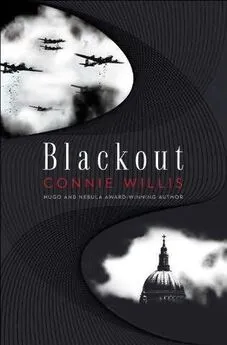Connie Willis - Blackout
- Название:Blackout
- Автор:
- Жанр:
- Издательство:неизвестно
- Год:неизвестен
- ISBN:нет данных
- Рейтинг:
- Избранное:Добавить в избранное
-
Отзывы:
-
Ваша оценка:
Connie Willis - Blackout краткое содержание
In her first novel since 2002, Nebula and Hugo award-winning author Connie Willis returns with a stunning, enormously entertaining novel of time travel, war, and the deeds—great and small—of ordinary people who shape history. In the hands of this acclaimed storyteller, the past and future collide—and the result is at once intriguing, elusive, and frightening.
Oxford in 2060 is a chaotic place. Scores of time-traveling historians are being sent into the past, to destinations including the American Civil War and the attack on the World Trade Center. Michael Davies is prepping to go to Pearl Harbor. Merope Ward is coping with a bunch of bratty 1940 evacuees and trying to talk her thesis adviser, Mr. Dunworthy, into letting her go to VE Day. Polly Churchill’s next assignment will be as a shopgirl in the middle of London’s Blitz. And seventeen-year-old Colin Templer, who has a major crush on Polly, is determined to go to the Crusades so that he can “catch up” to her in age.
But now the time-travel lab is suddenly canceling assignments for no apparent reason and switching around everyone’s schedules. And when Michael, Merope, and Polly finally get to World War II, things just get worse. For there they face air raids, blackouts, unexploded bombs, dive-bombing Stukas, rationing, shrapnel, V-1s, and two of the most incorrigible children in all of history—to say nothing of a growing feeling that not only their assignments but the war and history itself are spiraling out of control.
Blackout - читать онлайн бесплатно полную версию (весь текст целиком)
Интервал:
Закладка:
They don’t know where I am, he thought. It was the only explanation. But why not? Even if they hadn’t been able to find out anything in Saltram-on-Sea, they’d known he’d intended to go to Dover. They’d have scoured the town, checked the police station and the morgue and all the hospitals. How many were there? He hadn’t had time to research that because of wasting that afternoon waiting for Dunworthy. “How many hospitals are there here?” he asked Sister Gabriel when she brought his medicine.
“Here?” she said blankly. “In England?”
“No, here in Dover.”
“I say, you have been out of it,” Fordham said from his bed. “You’re not in Dover.”
“Not in-? Where am I? What hospital is this?”
“The War Emergency Hospital,” Sister Gabriel said. “In Orpington.”
This Way to the Air Raid Shelter?
– NOTICE ON LONDON STREET, 1940London-10 September 1940
IT TOOK EILEEN UNTIL TWO THE NEXT DAY SHUFFLED from bus to train to bus again-to get the children to London, by which time she’d spent over half of the money the vicar had given her on sandwiches and orange squash and reached the end of her patience with Alf and Binnie.
I am delivering them to their mother, and then I never want to see them again, she thought when they finally arrived at Euston Station. “Which bus do we take to get to Whitechapel?” she asked the station guard.
“Stepney’s closer than Whitechapel,” Binnie said. “You should take Theodore home first and then us.”
“I’m taking you to your house first, Binnie,” Eileen said.
“Not Binnie. I told you, my name’s Spitfire. Any rate, our mum won’t be there.”
“And if you take Theodore first,” Alf said, “we could help you find his street. You’ll likely get lost on your own.”
“I don’t want to go-” Theodore began.
“Not one word,” Eileen said. “Out of any of you. We’re going to Whitechapel. Which bus do we take for Whitechapel?” she asked the guard.
“I don’t know as you can get there at all, miss,” he said. “It was hit hard again last night.”
“I told you we should go to Stepney,” Binnie said.
“What sort of bombers were they?” Alf inquired.
“Shh,” Eileen said and asked the guard for the bus number.
He told her. “Though I doubt they’re running. And even if they are, the streets’ll be blocked off.”
He was right. They had to take three different buses and then get out and walk, and by the time they reached Whitechapel, it was half past four. Whitechapel looked like something out of Dickens-narrow, dark lanes and soot-blackened tenements. A pall of smoke hung over the area, and off in the distance Eileen could see flames. She felt guilty at the idea of abandoning Alf and Binnie to this, and even guiltier when she saw a tenement that had been bombed. One wall still stood, curtains at its blown-out windows, but the rest of it was a mound of timbers and plaster. Part of an upended kitchen chair stuck out of the mound, and she could see pieces of broken crockery and a shoe. Alf whistled. “Will ya look at that!” he said and would have climbed onto it-in spite of the rope barrier-if Eileen hadn’t caught hold of his shirt collar.
There was another mound of rubble on the corner and, at the end of the next street they crossed, the blackened skeleton of an entire row of houses.
What if when we get there, Alf and Binnie’s home has been hit? Eileen thought worriedly, but when they turned in to Gargery Lane, all the houses were intact, though they looked as if a good, hard push could topple them, let alone a bomb. “We can find our way from ’ere,” Alf said. “You needn’t go with us.”
She was sorely tempted, but she’d promised the vicar she’d hand them over to their mother personally. “Which one is yours?” Eileen asked him, and Alf pointed cheerfully at the flimsiest-looking tenement of all.
And it must be theirs because when she knocked on the front door, the woman who answered growled, “I thought we’d got rid of the two of you. You stay away from my Lily.”
When Eileen asked if Mrs. Hodbin was home, she snorted. “Mrs. Hodbin? That’s rich, that is. She’s no more a missus than I’m the Queen.”
“Have you any idea when she might be home?”
She shook her head. “She never come home last night.”
Oh, no, what if she’d been killed in the bombing? But neither the woman nor Alf and Binnie seemed worried. “I told you you should take Theodore home first,” Binnie said.
“I’ve brought Alf and Binnie home-” Eileen began.
“Spitfire,” Binnie corrected.
“-Alf and his sister home from Warwickshire for the Evacuation Committee,” Eileen said to the woman. “Can I leave them with you till their mother returns?”
“Oh, no, you’re not going to land me with them two. For all I know, she’s gone off with some soldier again, and then where would I be?”
In exactly the same position I am, Eileen thought. “Well, is there someone who could watch-?”
“We ain’t babies,” Alf protested.
“We can stay by ourselves till Mum comes back,” Binnie said. “If this old cow’ll give us our key-”
“A good beating, that’s what I’ll give you,” the woman said, “both you and that brother of yours. And if you was mine, I’d give you a lot worse.” She shook her fist at Eileen. “And don’t you try goin’ off and leavin’ ’em, or I’ll call a policeman,” she said, and slammed the door in their faces.
“I ain’t afraid of no police,” Alf said staunchly.
“And we don’t need no key,” Binnie said. “We got lots of ways of getting’ in ’thout that old cow knowin’.”
I can imagine, Eileen thought. “No, I promised the vicar I’d deliver you to your mother. Come along. We’re going to Stepney.” And please let Theodore’s mother be home.
She wasn’t. When they reached Stepney, after an even longer and more roundabout trek, her neighbor, Mrs. Owens, said, “She’s left for the night shift. You’ve only just missed her.”
Oh, no. “When do you expect her home?”
“Not till the morning. They’re working double shifts at the factory.”
Worse and worse.
“But Theodore’s welcome to stay the night with me,” Mrs. Owens said. “Have you had your tea?”
“No,” Binnie said vehemently.
“We’re not ’alf-starved,” Alf said.
“Oh, you poor lambs,” she said and insisted on making them toasted cheese and pouring Eileen a cup of tea. “Theodore’s mother will be so glad to see him. She’s been that worried, what with all the bombings. She’s been expecting him since yesterday afternoon,” and listened, clucking sympathetically, as Eileen told her what had happened.
It was wonderful, sitting there in the warm, tidy kitchen, but it was growing late. “We must be going,” she said when Mrs. Owens urged a second cup of tea on her. “I must get Alf and Binnie home to Whitechapel.”
“Tonight? Oh, but you can’t. The sirens may go any minute. You’ll have to leave that till the morning.”
“But-” Eileen said, her heart quailing at the thought of setting out with Alf and Binnie to find a hotel, if Stepney even had such a thing. And the cost!
“You must all stay here,” Mrs. Owens said.
Eileen gave a sigh of relief.
“Theodore’s mother gave me her key,” Mrs. Owens went on. “I’d have you here, but there’s no Anderson, only that cupboard.” She pointed at a narrow door under the stairs.
What is she talking about? Eileen wondered, following her next door with the children in tow. And who’s Anderson?
“The children can sleep in here,” Mrs. Owens said, showing them into the sitting room. “That way you won’t have to get them down the stairs.” She opened a linen closet and brought out blankets. “It’s a bit dampish for my old bones. That’s why I didn’t have one put in. Still, going out to the back garden’s better than going all the way to Bethnal Green in the blackout. Mrs. Skagdale, two doors down, fell off the curb and broke her ankle night before last when the sirens went.”
The air raids, Eileen thought. She’s talking about the air raids. And an Anderson was some sort of shelter. She hadn’t researched shelters. The whole point of sending the children to Backbury had been to get them away from the need for shelters. Mrs. Owens had said it was in the back garden. While she took the children upstairs to fetch pillows, Eileen ran outside to look at it.
At first she couldn’t find it and then realized the large grassy mound by the back fence was it. It was a corrugated iron hut, which had been sunk into the ground with dirt piled around it on three sides and on top of its curved roof. Grass was growing on top.
Like a grave, Eileen thought. The end that hadn’t been banked with dirt had a metal door. She opened it, and Mrs. Owens was right. It smelled damp. She peered in, but it was too dark to see anything.
I need to ask if Mrs. Willett has a torch, she thought, and went back inside, where she found Alf and Binnie whaling away at each other with the pillows. “Stop that immediately and put on your nightclothes,” she said, apologized to Mrs. Owens, and asked her about the torch. Mrs. Owens found it and a box of matches for her. “For the hurricane,” she said cryptically and made Eileen promise to come ask if she needed anything else.
“Should I take the children out to the Anderson now?” Eileen asked her anxiously at the door.
“Oh, no, there’ll be plenty of time once the sirens go. A quarter of an hour at the least.” She looked up at the darkening sky. “If they go. I’ve a premonition Hitler’s told them to stay home tonight.”
Good, Eileen thought, and went back inside to separate Alf and Binnie, who were battling over the right to sleep on the sofa. She pulled the blackout curtains together and helped Theodore into his pajamas, then trooped them all upstairs to the loo and back down to the sitting room, put Theodore on the sofa-“Because it’s his house, Alf”-made up beds for Alf and Binnie on the floor, set the torch by the back door, switched off the lamp, and sat down in the overstuffed chair, listening for the sirens and hoping she’d recognize them when she heard them. She hadn’t researched sirens either. Or bombs.
She’d only just decided it was safe to take her shoes off when she heard the sirens, and then, before she could get her shoes back on, the ominous buzz of approaching planes. And immediately after, the distant crump of a bomb. “Binnie! Alf! Wake up! We’ve got to go to the Anderson.”
“Is it a raid?” Alf said, instantly alert. He leaped up and then stood there looking up at the ceiling, listening. “That’s a Heinkel III.”
“You can do that in the Anderson. Hurry. Take your blanket with you. Theodore, wake up.”
Theodore rubbed his eyes sleepily. “I don’t want to go to the Anderson.”
Of course. She wrapped the blanket around him and picked him up in her arms. There was a boom, and then another, much louder. “They’re comin’ nearer,” Alf said happily.
“Let’s go. Hurry,” Eileen said, trying to keep the panic out of her voice. “Binnie, fetch the torch-”
“My name’s Spitfire.”
“Fetch the torch. Alf, open the door-no, switch off the lamp first.” She got the torch and matches from Binnie, and they ran out the back door and across the grass, the torch’s beam lighting a wobbly path in front of them.
“The ARP warden’ll get you for showin’ a light,” Alf said. “You could go to prison.”
Binnie reached the Anderson first. She opened the low door, stepped in, and backed out again. “It’s wet!”
Читать дальшеИнтервал:
Закладка:

![Jane_BlackCat - Понять не поздно... [СИ]](/books/1148838/jane-blackcat-ponyat-ne-pozdno-si.webp)
![Jane_BlackCat - За краем Вечности [СИ]](/books/1148839/jane-blackcat-za-kraem-vechnosti-si.webp)

